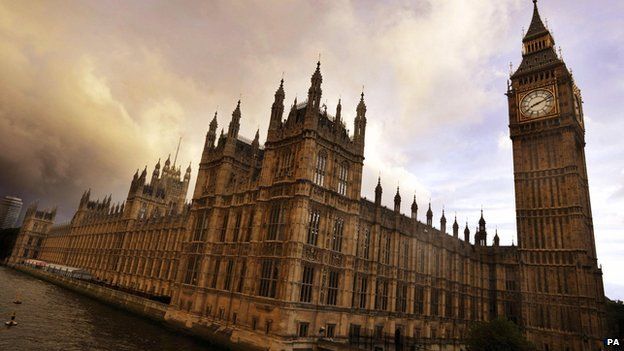Election should include online voting in 2020 - Bercow
- Published

People should be able to choose to vote online in the 2020 general election, a commission set up by Commons Speaker John Bercow has concluded.
The Digital Democracy Commission also envisages public participation in Commons' debates via an internet forum.
And there would be moves to encourage more young people to register to vote.
Speaking to BBC political editor Nick Robinson for Radio 4's Can Democracy Work? series, the Speaker said he saw a "growing appetite for online voting".
The BBC's political editor on Digital Democracy Commission calling to allow people to take part in online voting
He said: "I don't mean by that that it will necessarily at any stage be compulsory to vote in that way, but I think that the notion that, if it can be established as secure and reliable people should have the option to vote online, will gain ground more and more and more."
He said the 2020 poll "could be the first election in which people have the opportunity... to vote online".
Other recommendations in the commission's report include:
- Allowing MPs who are unwell or have childcare responsibilities to be permitted to vote in the Commons electronically, without having to go into the chamber
- Ending restrictions on members of the public using mobile phones in the public galleries in the Commons
- Experimenting with providing live social media coverage of Commons debates
E-voting at a glance
- Electronic voting began in the 1960s with the use of punched card systems
- More modern systems include electronic machines in polling stations operated by buttons or touchscreens which connect to a central database
- Countries using forms of e-voting include the US, Brazil, Belgium, Estonia, the Philippines and India
- The term "e-voting" includes online voting where electors can cast their ballot from any computer using a secure ID
The report also says parliamentary language and procedures should be simplified so that, by 2020, "everyone can understand what the House of Commons does".
Labour MP Graham Allen welcomed the aspiration on online voting, saying the Commons Political and Constitutional Reform Committee which he chairs had been urging the move for some time.
"Speaker's recommendations mirror many of 3,000 responses to the select committee's report on voter engagement," he tweeted.
'Body politic'
He said he would raise the issue and the report's other recommendations in a parliamentary debate later this month.
Estonia, which has pioneered e-voting since 2005, says that up to a quarter of voters have used the internet in some polls but experts have warned of worrying security gaps.
Mr Bercow described the idea of the online forum enabling members of the public to question MPs in debates as "exciting".
He said: "For members of Parliament whilst conducting their debate, to be aware of and capable of responding to what people outside are saying, would at least start to fuse the two parts of the body politic."
Asked if he would liken public participation to "another chamber" in Parliament, Mr Bercow said: "I don't know whether I would call it a chamber but the idea of there being potentially a simultaneous dialogue between chambers of Parliament and members of the public, seems to me not an idea to be afraid of at all."
'Voting pilot'
Speaking in the House of Commons last Friday - in a debate on allowing Britons living abroad to vote online - Cabinet Office minister Sam Gyimah said moving to electronic voting would be a "huge task" for any government.
"We cannot be under any illusion this would be easy to achieve," he said.
"The fact electronic voting is incredibly rare across the globe I believe is testament to some of the problems delivering it."
But tech experts said harnessing the internet and social media was vital to keeping young people engaged in politics.
"There are of course important issues like privacy and security, but we are confident the tools exist to address these challenges," said Antony Walker, deputy chief executive of Tech UK, which represents 850 digital companies.
Labour said the report made some interesting proposals which should be considered.
"Labour is committed to piloting online voting to see if it can be done securely and affordably," said shadow leader of the House of Commons Angela Eagle.
"We will also create a new democracy portal to draw together in one place all of the things you need to know before you vote, we will make it easier to register to vote and we will reform the scrutiny of legislation to formalise a role for the public and give a greater role to backbench MPs."
Can Democracy Work? is on BBC Radio 4 on Tuesday at 09:00 GMT
- Published16 January 2015
- Published24 December 2014
- Published27 June 2014
- Published10 June 2014
- Published28 November 2013